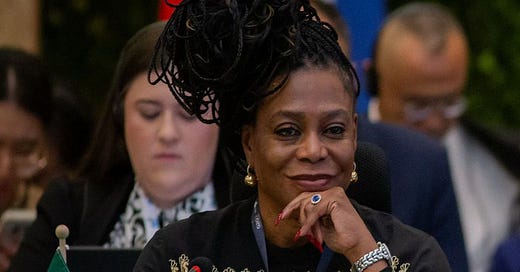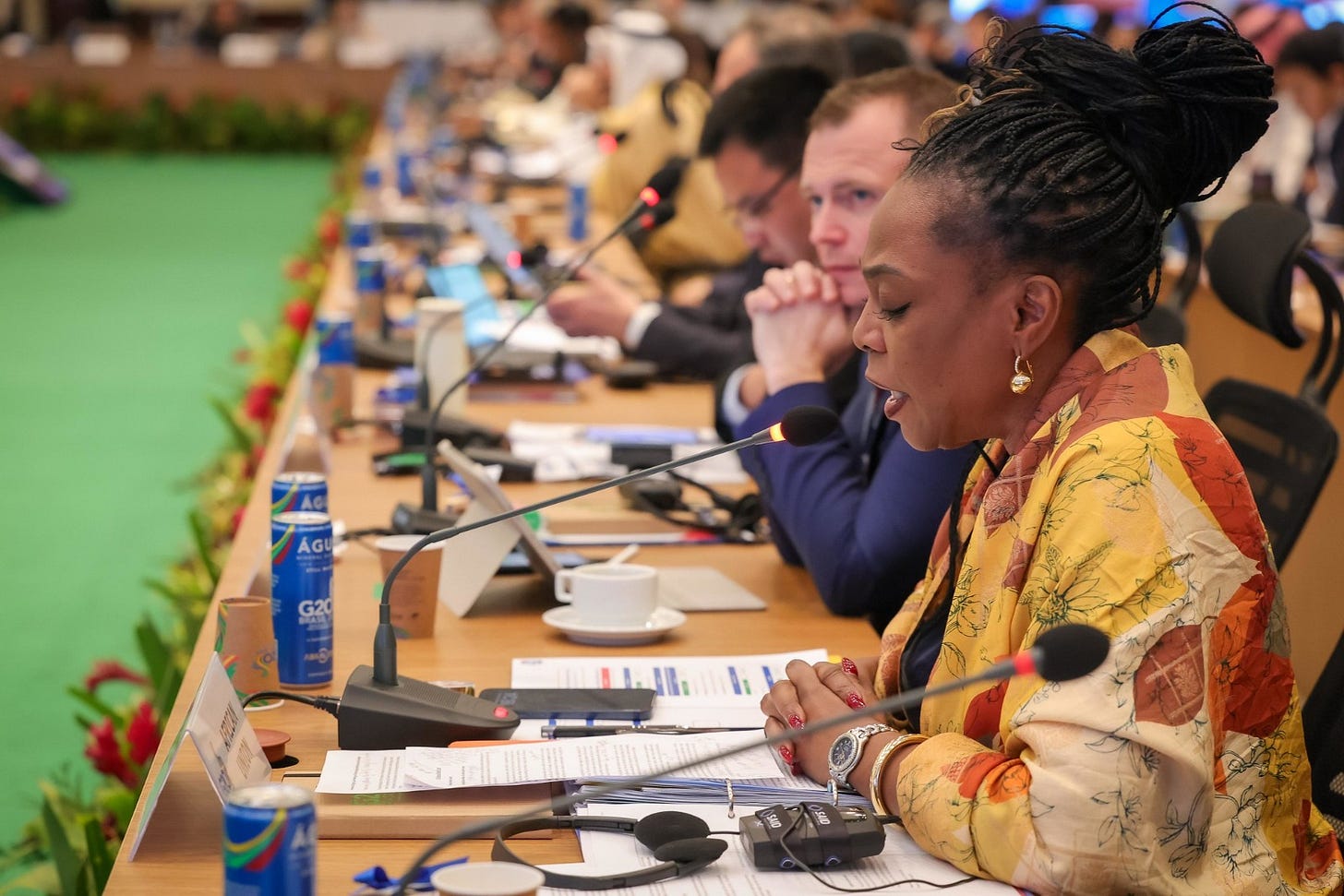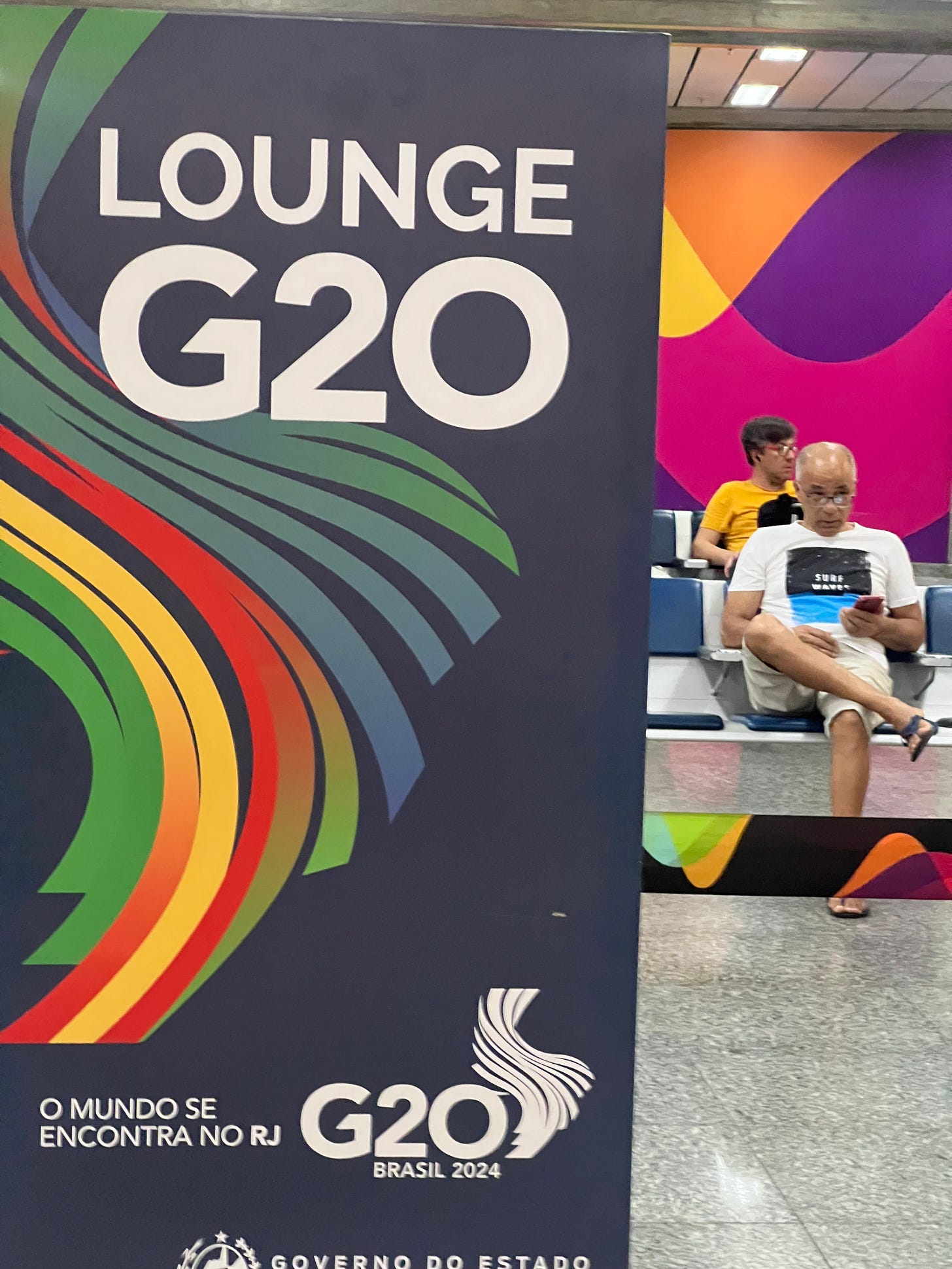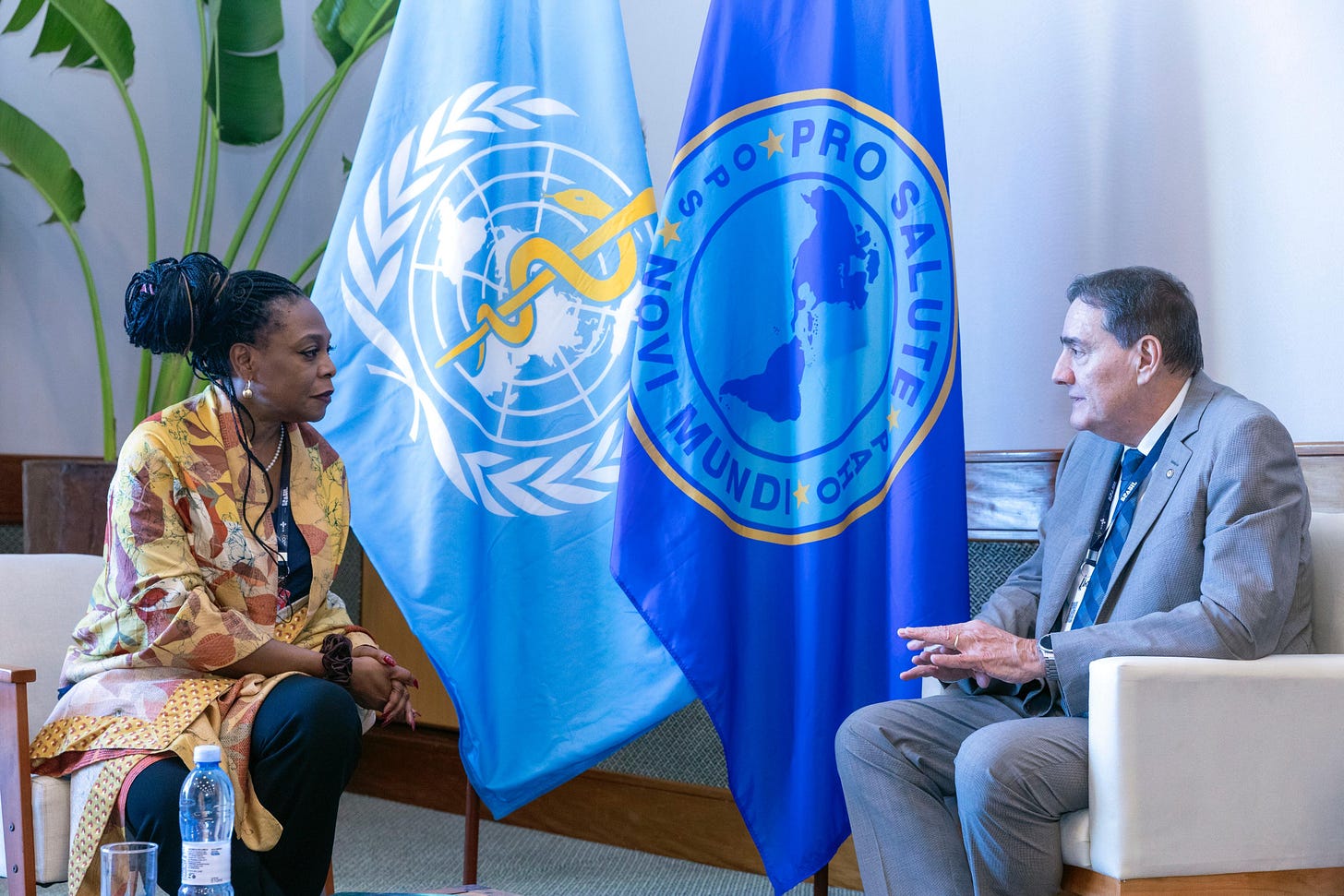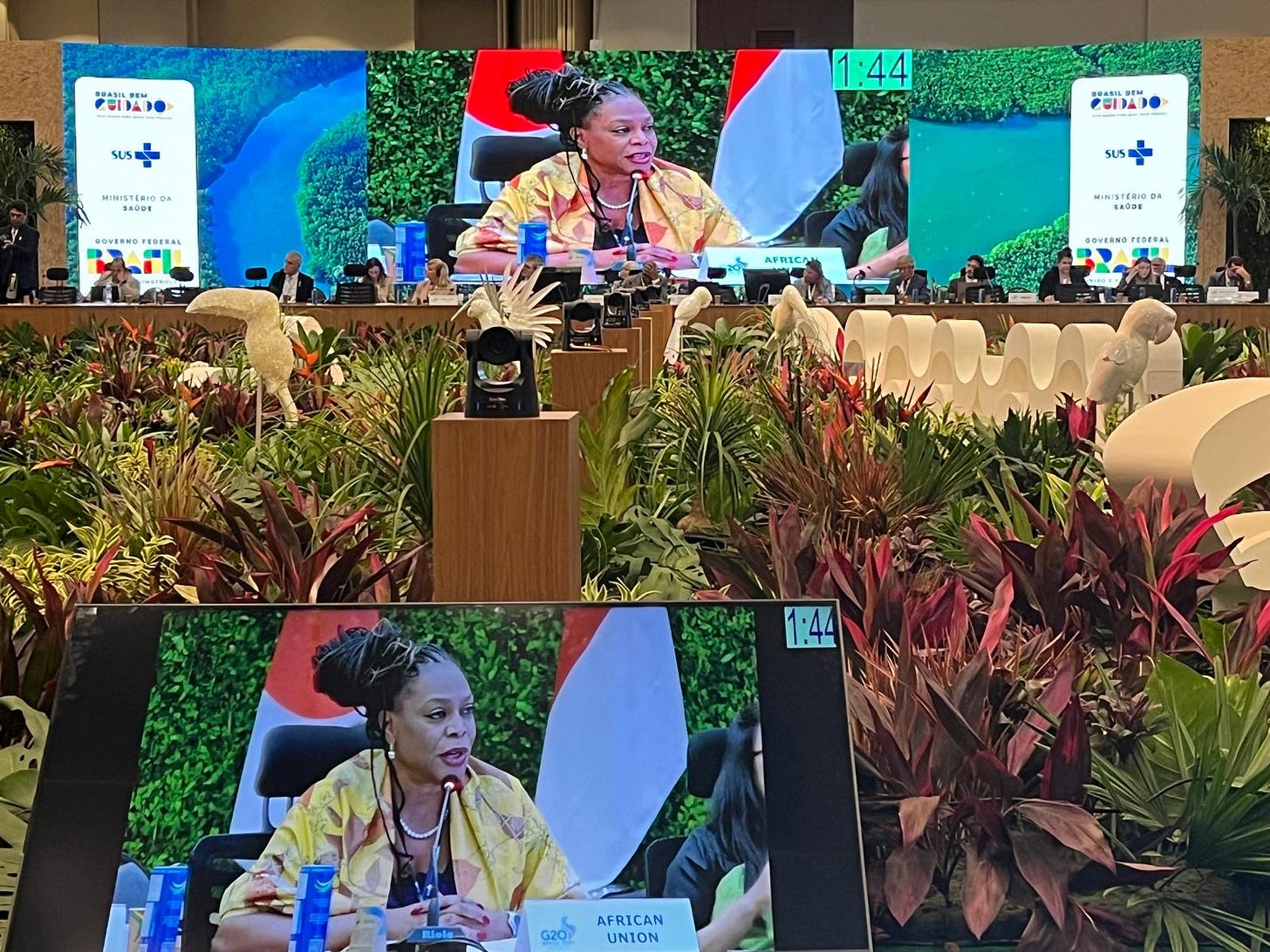Past the Tipping Point- Part Two: Philanthro-capitalism, Global Health & Development
Since publishing my last substack article, ‘Past the Tipping Point: The Ugly Underbelly of the Global Health Industry’ I have been pulled into an incredibly busy work period and circumstances where every statement I made was reinforced time and time again by experience.
Almost immediately after calling out institutional racism, exclusion and marginalization of especially black voices in global decision-making institutions, I found myself forced into a week-long abeyance. I was poised for action with my bags packed, ready and waiting to make a last-minute dash to the airport to catch a flight to New York for UNGA and other meetings in the USA. I spent the time watching proceedings from afar and preparing for a host of speaking engagements at events where I had been asked to represent the interests of FIND. But instead of making valuable contributions to critical discussions about AMR, financing global health and global health financing and architecture, this voice from the global south was sidelined there. I was stuck in Abuja. Why, you may ask? The fact of the matter is that I was unable to attend the first few days of UNGA High Level Week because my visa was delayed.
I felt extreme frustration, upset and outrage but this is sadly just one example of the hoops and administrative rigmarole that one endures as a global health leader from the global south, where the stumbling blocks on the road to equity remain firmly embedded. It is also a stark reminder of the power dynamics at play in our so called ‘global village’. How can we ensure our voices are heard at the global table, when we aren’t allowed to get to the table? How do we ensure that representative voices on the global stage are authentic voices, with lived experience, not tokenistic representation?
A number of the fora I was to speak at were related to financing global health- be that for AMR, achieving the SDGs or pandemic preparedness, money makes the world go round. With the desire to unlock funding to address global challenges including health everywhere, then the voice of the global south which is more than half the world’s population must be heard! Discussions about us must not be allowed to go on without us.
In my recent article[1] I also drew attention to[2] the lack of transparency and accountability in the world of global philanthropy and exposed the widespread and insidious levels of racism and sexism in the world of global health, linking both to the imploration from the global south for a rebalance of power relations. There is no place for fossilised thinking, inequity and discrimination in the fight to eradicate poverty and to achieve health for all. We cannot afford to continue to exclude people who represent almost 80% of the world’s populations[3] from decision making structures and systems if the Sustainable Development Goals[4] are to be achieved.
These are painful truths to confront[5]-it is both mentally and emotionally exhausting. And speaking truth to power often comes at a cost, but those of us with a voice must speak up for those who do not dare. Further, the [6]level of response to my last article indicates that a nerve has been struck and that this conversation needs to be had to ensure that members of the global south in the global health and development arena gain voice and visibility.
Representing the voice of Africa at the G20 Health Ministerial Meeting in Rio, Brasil 2024
The personal is political, And we must be prepared to tell our stories, many are extraordinary tales of courage and strength, tenacity and dedication to a cause in the face of concerted action to deny, denounce and denigrate our person, out reputations and the focus on the lives of people from the global south.
It is important to document these experiences, in detail because they are a powerful example of the nature of sexism and racism experienced by people from the global south on a daily basis. It is often only through sheer force of character that one is able to withstand the onslaught of what can only be described as a weaponisation of institutions by people who are able to manipulate the systems, and processes and resources in order to protect their privileged position, access to high salaries and positions of power.
People are often empowered to misuse their position by the lack of accountability, toxic culture and poor governance controls and by lack of leadership .
While we face personalised abuse and requests to ‘not play the race card’ this request effectively asks us to reduce the issue of race to a cheap tactic only to be deployed for personal gain and is another example of people of colour being told to stop making others feel uncomfortable – their discomfort clearly doesn’t matter. If women fighting for gender equality had listened to those that told them not to’ rock the boat’ we wouldn’t have made any progress on gender equality – the fght against racism cannot afford to make that mistake.
This sense of entitlement by people, and their assumption of superiority is a vignette of the types of behaviours that have characterised the institutions that are mandated to deliver a step change in development outcomes, in the face of stalled progress against the Sustainable Development Goals ( SDGs), global health pandemics, the roll back of women’s rights and concurrent geopolitical crises. The cronyism – of informal cabals and networks reinforcing each other’s inadequacies, nepotism - of friends recruiting friends and lovers, favouritism – paying themselves bonuses and high salaries whilst more junior staff remain unremunerated and underpaid, all adds up to a toxic culture that allows prejudice in the form of racism and sexism to ferment, unchecked.
The actions of privileged individuals, has resulted too often in a co-ordinated campaign of abuse, bullying and personalised threats – of a racist and sexist nature- which many people of colour, especially women have too often experienced, with most bowing to the onslaught and returning to a place of safety – outside of the institutions that purport to serve them. This is what institutional racism looks like – the actions of individuals who can get away with abusing the resources and their positions within the institution for personal gain at the expense of those who don’t fit their profile. The lack of checks and balances within organisations allows them to co-opt the networks, the profile and the institutional power of within and turn it against the threat to their power – often against those who threaten their cosy cabal.
The result is that too many institutions which houses the decision making power over the lives of those in the global south, remains predominantly white and lack the diversity that is needed to enable them to effectively deliver their mandate with credibility and authenticity. The racism can be seen as a form of attack against a ‘foreign body’ with the racist ‘antibodies’ coalescing to remove the perceived threat to their existence. Too often, that threat is us.
Women, and in particular black women in the global health industry wrote to me to say that the article had a potent emotional impact upon them. Founders of the One Foundation, Former Prime Minster of New Zealand, Rt Honourable Helen Clark, and influential ‘king makers’ of the global health world responded with calls for action and requests for a conversation around the article’s central thesis, which in their own words is ‘true and indefensible’ and ‘an indictment of philanthro-capitalism’[7][8]. There has also been a substantive reaction from those working at senior levels within philanthropies: This may have been a powerful calling out of racism and sexism, but my experience in the week that followed firmly reinforced my resolve to keep speaking the truth to the powers that be. I am in complete agreement with Rt Honourable Clark who said that the matters explored in the article are reprehensible and am all but deafened by the silence from so-called friends and allies who have yet to speak up.
Historically, philanthropists and heads of international global health and development agencies have always set the agenda, defined the outcomes, controlled the finances, and dictated who has a say in determining how their institutions are run. In doing so,[9] they have also exerted great control over the narrative about the health, nutrition, infrastructure, destinies, sovereignty and future of individuals and nations in the Global South. But do they follow due process, and how accountable are they?
It is time to upend these pillars of institutional inequity and bring about reform. Only by moving out of their comfort zone and engaging with innovative ideas and fresh voices speaking to the need to reset the ingrained power imbalance will development agencies become part of the solution rather than perpetuate the problem[10]. This is equally applicable to emerging philanthropies in the global south, to the black and brown captains of industry in India, Nigeria and elsewhere who might choose to make considerable contributions to development initiatives. They must take note of the mistakes made by their global north predecessors[11] and ensure that their financial influence is used to rebalance the unfair systems that have constrained their compatriots for centuries.
As I sat initially excluded from the United Nations General Assembly (UNGA), because I couldn’t travel, it was clear that no part of the global health and development architecture can remain disengaged from scrutiny and accountability[12]. A reset and redefinition of the problem and the language used to define it are needed. When we use the term ‘Global South’[13] we subsume a myriad of different voices and experiences and when we define the architecture of aid as a donor-recipient relationship, we automatically cast the global north into the role of the powerful saviour and the global south as the passive, powerless recipient. The inbuilt power imbalance in the aid industry is codified in language that helps to legitimise actions that maintain the status quo. If we are to rebalance the power relationship and restructure the donor-recipient architecture of aid, then we need a new lexicon that is infused with the colour and imagery of the global south and is based on concepts and principles that are both universal and described in the language of mine and my brothers and sisters’ forebears.
When I am able to traverse the globe attending various engagements to ensure the global south is at the decision making table, I am acutely aware of the opportunity costs that people of colour like myself must pay in order to deliver within the current layouts and lexicons of global health. Getting a visa is often an exercise in frustration if not futility involving long queueing, questioning and waiting. Absorbing the emotional and financial costs of not receiving the visa required to enter the USA is not a one off. I have also had to pay the costs for a cable to be laid to my house in Abuja so that I could secure decent internet access required to fulfil my duties as the board chair of FIND/ ACT A- yet I am part of the populations for which these institutions are set up to serve. I know of other global health staff from the global south who have had to jump through interminable hoops just so that they can open a bank account in the global north. And that price is not just paid in dollars and pounds, it is also paid through the tolls taken by being away from family – often for long periods, by the anxiety and mental stress involved in travelling with a passport that requires extra scrutiny, and the physical toll of travelling between the professional and personal locations which are inevitably distant from each other but which constitute our homes and communities. All of this effort has to be made in advance of doing the job and having to deliver at the highest standards to maintain an unblemished level of professionalism for fear of succumbing to the stereotypes that keep us in check.
With Dr. Jarbas Barbosa, Director of the Pan American Health Organisation at G20 Health Ministers Meeting in Brasil.
Power must change hands, in order to achieve this, we must all be willing to share in the burden of discomfort that has been borne for so long by citizens of the global south . The discomfort and unease felt by people of colour working in the global health and development industry needs to be recognised as being rooted in racism, sexism and the requirement to avoid rocking the boat for fear of the dire consequences of doing so.
The discomfort of rebalancing requires present day global health and development institutions to let go of the reins of power, to actively allow the voices of the global south to be heard and to work for a future where health and development is based on reciprocity rather than the current extractive modality.
As the world’s leaders convened in New York to review the progress made towards the SDGs and to identify further solutions to current global challenges, it struck me that that we were experiencing a geopolitical earthquake. The accepted norms around democracy and the rule of law that undermines progress on women’s rights and health outcomes and wider social determinants of health are built on shaky ground. We are seeing countries turn their attention away from health and humanitarian crises as national focus becomes increasingly domestic and protectionist. Alongside an economic downturn, ever-decreasing donor funds are further diluted through being diverted to Ukraine[14] and the Middle east. The current situation feels increasingly similar to geopolitics in the period between the late 1800’s and 1942[15] when the world was fractured, and two world wars were waged on the basis of fighting fascism and authoritarianism. The aftermath of those wars led to the creation of a new world order that has since protected the interests of the global north at the expense of the rest of the world. Let us not allow the current fractures to lead to another world war that we can ill afford and that no one will win. The heightened technological advancement and proliferation of arms and the predominance of malign non state actors many of which are weaponizing social media[16] and AI[17] for their own ends all increase the risks and strengthens the impetus to take action.
It is past time for the philanthropists, captains of industry, the heads of global agencies and the global decisions makers to decentre their own comfort – not out of guilt or as a tokenistic gesture of solidarity - but because these are the actions that are required to change the status quo.. Leaders from the Global North must be willing to use unfamiliar language and work in ways unfamiliar to their culture – something that black and brown colleagues have been doing for decades[18].
Loyce Pace, Assistant Secretary of Health and Human Services US Government. November 2024.
The answers are multifaceted and beyond the immediate scope of this paper. However, one action is to move beyond conversations towards tangible and challenging actions. Getting uncomfortable means promoting greater transparency and accountability within the decision-making structures of global boards of philanthropic organisations[19]. It is time for serious introspection to ensure philanthropies are doing good, not making things worse in the long term for those who are purportedly being served. One option is to ensure boards of philanthropies commit to at least 50% board membership for representatives of communities that the philanthropy seeks to serve. Rather than those who are beholden to the philanthropy. Philanthropic boards must include those who dare speak truth to power and ensure representation of younger generations with all members having equal voting rights.
Shadow boards can serve as a secondary accountability mechanism with representatives of the global south who receive board papers for consideration and provide their views in advance of board meetings and who then attend the board meetings to speak directly to the issues. This set up would help to ensure that those who are meant to benefit from the philanthropy become part of the decision making, so that philanthropy is enacted in a way that is ‘done with’ recipients instead of them being ‘done to’. Additionally, hiring and recruitment practices such as advertising in non-traditional spaces, establishing a fast track for good candidates and setting targets for promotion and progression through the ranks of seniority can help level the playing field and enable qualified candidates from the global south to succeed.
Getting uncomfortable also means relinquishing the power that has been centralised. I propose that philanthropists grant both 50% of their annual spend to organisations in the global south, and endow at least 50% of their capital to organisations that are authentically in, and of, the global south, in perpetuity to effectively hand over the decision making, the control and ultimately and perhaps most importantly, the power. This will require trust, and in some instances an uncomfortable level of risk.
Furthermore, I propose a candid reckoning of the hidden and unacknowledged costs for people of the global south who support and work for these philanthropies and global health organisations. What is the additional cost of engaging in this world? Who pays for their visas, for their families, for the extra travel and the split households that are a result of moving or travelling to northern capitals and leaving families behind? Who is paying for the childcare and the education that they must arrange to ensure global south voices are heard in global discourse? What are the other hidden costs that need to be surfaced, acknowledged and compensated for? I have many examples of spending personal time and money on obtaining visas to travel for work, or maintaining infrastructure that is taken as given in the global north such as electricity and an internet connection in a country with frequent electricity cuts and limited connectivity. How do we ensure that the opportunity costs of working in global health are borne by institutions and not by individuals from the global south who can least afford it?
Nothing is gained from comfortable conversations. We must endure the pains of transformation and transcend our fears of change to have courageous conversations in the spaces inhabited by the voices of the global south. The conversation needs to move beyond on-line articles and journals to in person spaces, including the hallowed halls of geopolitical power, e.g. UNGA and G7/G20 and be translated into decisive actions, progressive policies and equitable practices. I call on global decision makers to enter into the conversation with a willingness to engage with people and places that are unfamiliar to them and to listen and learn in a cultural and linguistic lexicon that is not their own. I call on citizens of the global north to de-centre their own comfort and step into the periphery that is currently crowded with the vast majority of the global population. I call on philanthropists to relinquish their personal power.
While all of this might seem somewhat idealistic, it seemed perfectly possible back in July as we witnessed a white man who was in the running for one of the most powerful positions in the world purposefully step aside to graciously endorse the candidacy of a black woman. Now in post-election November, we are faced with the knowledge that what won the election, was not the highly qualified black woman with esteemed law qualifications and credentials but the white man whose alma mater published an open letter signed by 30 professors urging America’s business leaders to decry him after the storming of the capitol building on January 6th, 2021.
Sadly, I could go on painting this painfully contrasting picture, but the overarching truth of the matter has been summarized by Van Lathan and Rachel Lindsay in podcast on Black culture, Higher Learning, “ It’s a masterclass in white privilege. He can’t commit enough crimes to be a criminal. He can’t fail enough times to be a failure. (…)He is so shielded and insulated by the idea and the concept of whiteness that he is untouchable. The thought conjured around him matters more than any reality. (...) It’s the whiteness he guarantees to protect. That’s what he represents.”
Unfortunately, this is not rhetorical. During Trump’s last term, his administration ordered federal agencies to terminate all trainings on racism and racial bias and banned by executive order the provision of trainings related to race and gender discrimination for the US armed forces, federal agencies, contractors and used federal funding as leverage to ensure that all recipients of grants had to follow suit. The 2024 campaign doubled down on the eradication of DEI policies and to dismantle progress made in civil rights. He claimed that immigrants were taking ‘black jobs’ and ‘poisoning the blood of our country’, that minority groups are genetically predisposed to committing crimes and incited racial crimes by claiming that Haitians were eating cats and dogs in Springfield Ohio. The mind boggles and the heart breaks. It’s this mind set which is now being mainstreamed.
Harris won 86% of the black vote but it would seem that their voices were drowned out by the rallying cries of ‘Lock her up’ and ‘Drill baby, drill’. As former Washington Post columnist Mike Wise posted on X when the winner became clear, ‘Its not just that Trump won (…) Racism won. Misogyny won. Sexism won. Global warming won. Xenophobia won (…)’ Let us be clear that each and every one of these is a major loss for Global Health.
The intersection between the health and climate crises is becoming increasingly and abundantly clear. Trump, meanwhile, openly claims that climate change is a “hoax”, withdrew from the Paris Agreement during his last term in office and has been highly critical of the Biden administration’s spending on cleaner energy and efforts to reduce the US consumption of fossil fuels which is the highest per capita in the world.
A wild ride looks to be written on the walls of the White (privileged male) House and I am chilled by the implications of my previous claims now seen in the light of the events that have unfolded in the short interim since I published them: ‘Where nepotism and personal networks dictate who makes decision and gets ahead, racism abounds. And where racism is unchallenged, the people in power will ensure that the institutions in which their power is held will not be challenged by diversity and equality. They will in fact, do their utmost to protect the status quo, will use and abuse their networks and weaponise the institution against those who challenge their power.
It would be laughable if it wasn’t so very harrowing- harrowing for immigrants, civil rights, diversity, those who are at most risk of climate catastrophes, black and brown people, women and the Earth herself. What then can we do? We double down on our efforts and double up on the courage of our convictions. We dare to imagine a world of hope and joy where white men step aside to make space for black women and where individuals who have the least experience with poverty are held accountable for their actions, where we choose to step out of our comfort zones to disrupt the status quo instead of jumping headlong into the abyss that is gaping before us more than ever.
As Toni Morrison said, ‘This is precisely the time when artists go to work. There is no room for despair. No place for self-pity. No need for silence. No room for fear. We speak, we write, we do language. That is how civilizations heal.’ Take radical care of yourself , your communities and your local landscapes as we continue to show up, stand side by side and do what we know in our hearts to be right.
[1] Alakija A. Past the tipping point: The ugly underbelly of the global health industry. Past the Tipping Point: The Ugly Underbelly of the Global Health Industry. 2024; published online Sept 4. https://ayoadealakija.substack.com/p/past-the-tipping-point-the-ugly-underbelly (accessed Sept 16, 2024).
[3] Economic data for the benefit of investors. World Economics. 2024; published online Sept. https://www.worldeconomics.com/Regions/Global-South/?Section=Demographics#POPULATIONPROFILE (accessed Sept 16, 2024).
[4] The 17 goals | sustainable development. United Nations. https://sdgs.un.org/goals (accessed Sept 16, 2024).
[5] Alakija A. Foreword, 2024 Global Health 50 50 Report: Gaining Ground? globalhealth5050.org (accessed Sept 17, 2024)
[6] Alakija A. Past the tipping point: The ugly underbelly of the global health industry. Comments - Past the Tipping Point: The Ugly Underbelly of the Global Health Industry. https://ayoadealakija.substack.com/p/past-the-tipping-point-the-ugly-underbelly/comments (accessed Sept 16, 2024).
[7] Haydon S, Jung T, Russell S. Int J Manag Rev. 2021; 23: 353–375. https://doi.org/10.1111/ijmr.12255
[8] Bishop, Matthew, and Michael Green. Philanthrocapitalism: How giving can save the world. Bloomsbury Publishing USA, 2010.
[9] staff PB: B. The merits and drawbacks of philanthrocapitalism. Berkeley Economic Review. 2019; published online March 14. https://econreview.studentorg.berkeley.edu/the-merits-and-drawbacks-of-philanthrocapitalism/ (accessed Sept 16, 2024).
[10] Beer, T., Patrizi, P., & Coffman, J. (2021). Holding Foundations Accountable for Equity Commitments. The Foundation Review, 13(2). https://doi.org/10.9707/1944-5660.1565
[11] Martins, Alex. (2020). Reimagining equity: redressing power imbalances between the global North and the global South. Gender & Development. 28. 135-153. 10.1080/13552074.2020.1717172.
[12] Olatunbosun-Alakija A. Unless we address the inequity in global health, then the world will not be prepared for the next pandemic. BMJ 2021; 375: 2848.
[13] Sinah Theres Kloß. “The Global South as Subversive Practice: Challenges and Potentials of a Heuristic Concept.” The Global South, vol. 11, no. 2, 2017, pp. 1–17. JSTOR, https://doi.org/10.2979/globalsouth.11.2.01. Accessed 16 Sept. 2024.
[14] Military spending and development aid after the invasion of Ukraine. SIPRI. https://www.sipri.org/commentary/topical-backgrounder/2024/military-spending-and-development-aid-after-invasion-ukraine (accessed Sept 16, 2024).
[15] Essential events between 1900 and 1945. Council on Foreign Relations. https://education.cfr.org/learn/timeline/essential-events-between-1900-and-1945 (accessed Sept 16, 2024).
[16] Oates, Sarah. “The easy weaponization of social media: why profit has trumped security for U.S. companies.” Digital War vol. 1,1-3 (2020): 117–122. doi:10.1057/s42984-020-00012-z
[17] Clark L. AI weapons among non-state actors may be impossible to stop. The Register® - Biting the hand that feeds IT. 2023; published online April 21. https://www.theregister.com/2023/04/21/ai_enhanced_weapons/ (accessed Sept 16, 2024).
[18] Gray, A. (2019). The Bias of ‘Professionalism’ Standards. Stanford Social Innovation Review. https://doi.org/10.48558/TDWC-4756
[19] McPherson K, Wagh P, Kaufman PB, Ubois J. How transparent philanthropy can liberate billions of dollars — and do more good. 2024; published online March 12. https://www.philanthropy.com/article/how-transparent-philanthropy-can-liberate-billions-of-dollars-and-do-more-good (accessed Sept 16, 2024).
